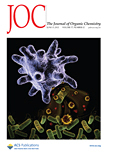
JOURNAL OF ORGANIC CHEMISTRY
Scope & Guideline
Elevating Research Standards in Organic Chemistry
Introduction
Aims and Scopes
- Organic Synthesis:
The journal extensively covers research on the synthesis of organic compounds, exploring new synthetic methodologies, reaction mechanisms, and applications in various fields, including medicinal and materials chemistry. - Catalysis:
A significant focus on catalytic processes, including transition metal-catalyzed reactions, organocatalysis, and photocatalysis, which are crucial for efficient organic transformations and sustainable chemistry. - Functionalization of Organic Molecules:
Research on the functionalization of organic molecules, particularly through C-H activation and other innovative strategies to introduce functional groups into complex organic frameworks. - Heterocyclic Chemistry:
A dedicated area of research involving the synthesis and study of heterocyclic compounds, which are pivotal in pharmaceuticals and agrochemicals. - Material Chemistry:
Exploration of organic materials, including the synthesis of polymers, organic semiconductors, and fluorescent compounds, highlighting their applications in electronics, photonics, and bioimaging. - Mechanistic Studies:
The journal emphasizes the importance of understanding reaction mechanisms, providing insights into the behavior of organic compounds during chemical transformations.
Trending and Emerging
- Sustainable Chemistry:
There is a growing emphasis on sustainable and green chemistry practices, including the use of renewable resources, reduction of hazardous solvents, and energy-efficient processes. - Photocatalysis and Photoredox Chemistry:
Research in photocatalysis has surged, with studies focusing on light-driven reactions that offer new pathways for organic synthesis, particularly in the context of sustainability. - Electrochemical Synthesis:
Electrochemical methods for organic synthesis are gaining popularity as they offer environmentally friendly alternatives to traditional methods, allowing for direct transformations without the need for stoichiometric reagents. - C-H Activation and Functionalization:
The field of C-H activation is rapidly evolving, with new strategies being developed to functionalize hydrocarbons, which is crucial for the synthesis of complex molecules. - Asymmetric Synthesis:
There is an increasing interest in asymmetric synthesis techniques, particularly those employing new catalysts and methodologies to achieve high enantioselectivity in organic transformations. - Material Science and Organic Electronics:
The synthesis and study of organic materials for applications in electronics and photonics, including organic semiconductors and sensors, are emerging as significant areas of research.
Declining or Waning
- Traditional Organic Synthesis Techniques:
There is a noticeable shift away from classical organic synthesis methods towards more innovative, sustainable approaches, such as green chemistry and photoredox catalysis. - Non-Catalytic Reactions:
Research focusing on non-catalytic reactions is declining as the field moves towards more efficient and sustainable catalytic processes. - Synthesis of Simple Organic Compounds:
The journal is increasingly prioritizing complex organic synthesis over simpler compounds, leading to fewer publications on straightforward organic reactions. - Conventional Solvent-Based Reactions:
There is a decreasing emphasis on traditional solvent-based reactions, with more researchers exploring solvent-free and eco-friendly alternatives.
Similar Journals
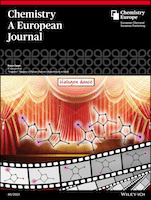
CHEMISTRY-A EUROPEAN JOURNAL
Advancing the Frontiers of Chemical ResearchCHEMISTRY-A EUROPEAN JOURNAL is a premier academic journal published by WILEY-V C H VERLAG GMBH, specializing in the diverse fields of chemistry and catalysis, with a distinguished focus on organic chemistry. Since its inception in 1995, the journal has established itself as an authoritative resource for researchers and professionals, currently classified in Q1 in Chemistry (miscellaneous) and Organic Chemistry, reflecting its high-quality contributions to the scientific community. With an impressive impact factor and robust Scopus rankings—#33 in Organic Chemistry and #26 in Catalysis—this journal serves as a vital platform for disseminating innovative research findings and critical advancements in chemical sciences. Although not an open-access journal, it provides valuable access options for institutions, ensuring wide reach and engagement within the scientific community. As it converges into 2024, CHEMISTRY-A EUROPEAN JOURNAL remains a key resource for anyone dedicated to advancing the frontiers of chemistry research.

ACS Organic & Inorganic Au
Catalyzing Discoveries in Open Access ChemistryACS Organic & Inorganic Au, published by the American Chemical Society, stands as a premier open-access journal dedicated to advancing the fields of organic and inorganic chemistry. Since its inception in 2021, this journal has swiftly risen to prominence, achieving a commendable Q1 classification in Inorganic Chemistry, Organic Chemistry, and Physical and Theoretical Chemistry as of 2023. With an ISSN of 2694-247X, it provides a vital platform for researchers, professionals, and students to disseminate their findings and engage with cutting-edge work across converged disciplines. Operating from its headquarters in Washington, DC, ACS Organic & Inorganic Au is committed to fostering a collaborative research environment, encouraging rigorous peer review, and ensuring the wide accessibility of high-quality scholarly articles. With its open-access model, readers worldwide can freely access and utilize research findings, promoting a global exchange of knowledge crucial for driving innovation in chemistry.
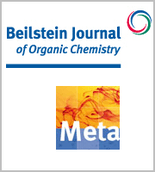
Beilstein Journal of Organic Chemistry
Catalyzing knowledge sharing in the realm of organic chemistry.The Beilstein Journal of Organic Chemistry, published by the renowned BEILSTEIN-INSTITUT, stands as a pivotal platform for advancing the field of organic chemistry since its inception in 2005. With its commitment to Open Access publishing, this journal enables global readership and collaboration, fostering the dissemination of high-quality research. Operating from Germany, the journal has carved out a significant reputation, currently holding a Q2 ranking in the Organic Chemistry category, with impressive Scopus rankings placing it at #91 out of 211 in the field, achieving a 57th percentile. The Beilstein Journal is dedicated to publishing cutting-edge findings that span the breadth of organic chemistry, including synthetic methodologies, catalysis, and material sciences, making it an essential resource for researchers, professionals, and students looking to stay at the forefront of organic chemistry advancements. With a vision to enhance collaboration and knowledge sharing within the scientific community, the journal plays a vital role in shaping the future of organic chemistry research.

ALDRICHIMICA ACTA
Pioneering Insights for the Chemistry CommunityALDRICHIMICA ACTA is a prestigious journal published by Aldrich Chemical Co Inc, focusing on the dynamic field of organic chemistry. With an impressive H-index and a strong Scopus rank of #38 out of 211 journals, this quarterly publication has established itself in the Q1 quartile of organic chemistry, a testament to its influence and relevance in research. The journal, which has been in circulation since 1990, disseminates high-quality research articles, reviews, and practical insights tailored for chemists, researchers, and industry professionals. While the journal operates under a subscription model, it remains a crucial resource for staying updated with the latest advancements and methodologies in organic chemistry. Located in Milwaukee, Wisconsin, ALDRICHIMICA ACTA continues to contribute significantly to the field, promoting excellence in scientific communication and collaboration.
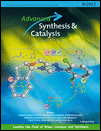
ADVANCED SYNTHESIS & CATALYSIS
Pioneering breakthroughs in synthesis and catalysis.ADVANCED SYNTHESIS & CATALYSIS is a prestigious academic journal published by Wiley-VCH Verlag GmbH, based in Germany. This journal, with ISSN 1615-4150 and E-ISSN 1615-4169, plays a pivotal role in the fields of Chemistry and Chemical Engineering, earning commendable rankings such as Q2 in Catalysis and Q1 in Organic Chemistry in 2023. Its high impact factor and recognition—ranking #18 in both Organic Chemistry and Catalysis—further underscore its significance as a platform for groundbreaking research and innovative methodologies. Spanning from 1996 through 2024, ADVANCED SYNTHESIS & CATALYSIS aims to disseminate high-quality, cutting-edge studies related to synthetic processes and catalytic technologies, ensuring accessibility via their open access options. By fostering a vibrant scholarly community, this journal serves as an essential resource for researchers, professionals, and students dedicated to driving advancements in synthetic and catalytic chemistry.
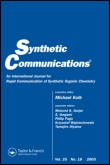
SYNTHETIC COMMUNICATIONS
Empowering Researchers with Key Insights in SynthesisSynthetic Communications, published by Taylor & Francis Inc, stands as a pivotal resource in the field of organic chemistry since its inception in 1971. With an ISSN of 0039-7911 and an E-ISSN of 1532-2432, this journal has established a commendable reputation, holding a Q3 ranking in organic chemistry by 2023, reflecting its contributions to the discipline and positioning it within the 50th percentile according to Scopus rankings. Targeted towards researchers, professionals, and students alike, Synthetic Communications aims to disseminate significant advancements in synthetic methodologies and reactions, facilitating the exchange of innovative ideas and enhancing collaborative efforts in the scientific community. Although not an open-access journal, it offers a wealth of valuable research content that is crucial for anyone dedicated to pushing the boundaries of organic chemistry.

EUROPEAN JOURNAL OF ORGANIC CHEMISTRY
Fostering Excellence in Chemical ScholarshipThe EUROPEAN JOURNAL OF ORGANIC CHEMISTRY (ISSN: 1434-193X; E-ISSN: 1099-0690), published by WILEY-V C H VERLAG GMBH in Germany, stands as a crucial platform for disseminating innovative research in the fields of organic, physical, and theoretical chemistry. With its inception dating back to 1998 and converging expertise until 2024, this esteemed journal has achieved a notable reputation, earning a Q2 rank in both Organic Chemistry and Physical and Theoretical Chemistry categories as of 2023, indicating its vital contribution to the academic community. Researchers and professionals will benefit from its rigorous peer-reviewed articles, which foster advancement in chemical sciences, while students can leverage its wealth of knowledge to enhance their learning. Although currently not an open-access journal, the content produced is invaluable for those looking to stay at the forefront of chemical research.
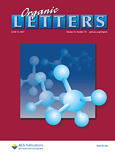
ORGANIC LETTERS
Advancing Organic Chemistry Through Rapid Research InsightsOrganic Letters is a leading peer-reviewed journal dedicated to the rapid dissemination of research in the field of organic chemistry. Published by the American Chemical Society, this esteemed journal has been an invaluable resource for researchers and professionals since its inception in 1999, featuring research articles that contribute significantly to the understanding of organic synthesis and related disciplines. With its impressive impact factor, it is currently ranked in the top quartile (Q1) across multiple categories, including Biochemistry, Organic Chemistry, and Physical and Theoretical Chemistry, showcasing its influence in the scientific community. The journal's commitment to quality is underscored by its high rankings in Scopus, placing it among the top tier of journals in its categories. While not an open-access journal, Organic Letters offers exceptional access options for institutions and individuals seeking cutting-edge research. As it continues to evolve towards its convergence year of 2024, it remains the go-to publication for innovative findings and methodologies in organic chemistry.
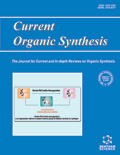
CURRENT ORGANIC SYNTHESIS
Advancing the Frontiers of Organic ChemistryCURRENT ORGANIC SYNTHESIS, published by Bentham Science Publishers Ltd, is a leading journal in the field of organic chemistry and biochemistry that serves as a vital platform for researchers and professionals advancing the synthesis of organic compounds. With an ISSN of 1570-1794 and an E-ISSN of 1875-6271, it boasts a significant impact within its category, ranked in the Q3 quartile for both biochemistry and organic chemistry as of 2023. The journal covers innovative research and reviews that enhance our understanding of organic synthesis methodologies, showcasing contributions that advance the field. Operating from Sharjah, United Arab Emirates, CURRENT ORGANIC SYNTHESIS has evolved since its inception in 2005, providing access to a wealth of information essential for students, professionals, and researchers alike. While it currently does not offer open access, the journal continues to maintain a strong community of scholars dedicated to fostering dialogue and innovation in the organic sciences.
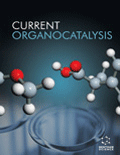
Current Organocatalysis
Connecting Researchers in the World of OrganocatalysisCurrent Organocatalysis is a premier academic journal dedicated to the dynamic field of organocatalysis, published by Bentham Science Publishers, Ltd. Based in the United Arab Emirates, this journal has been a valuable resource for researchers since its inception in 2014 and will continue to publish impactful articles until 2024. The journal provides a platform for sharing groundbreaking research, reviews, and insights that significantly contribute to the fields of Analytical Chemistry, Catalysis, and Organic Chemistry. With a Q4 ranking in several chemistry categories, it identifies and disseminates emerging strategies and methodologies in organocatalysis, promoting collaboration and advancement in the community. While it operates on a subscription basis, the journal ensures accessible content for its audience to further supplement academic learning and professional development. Researchers, professionals, and students are encouraged to explore and contribute to this critical field, leveraging the journal as an essential resource for the latest trends and innovations in organocatalysis.